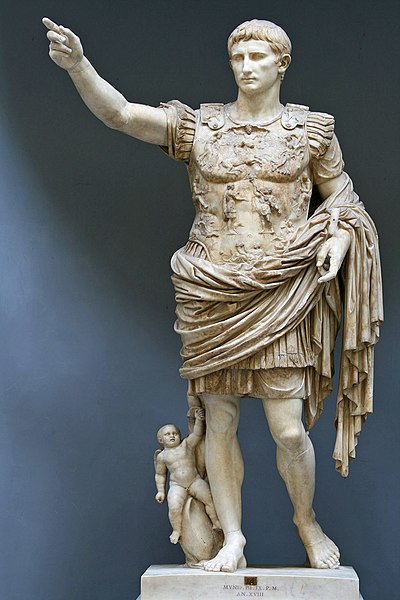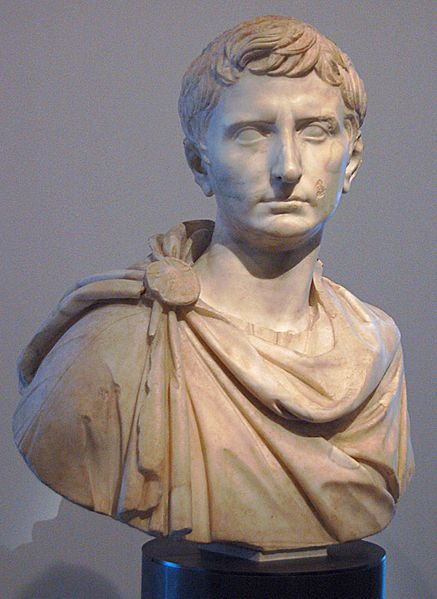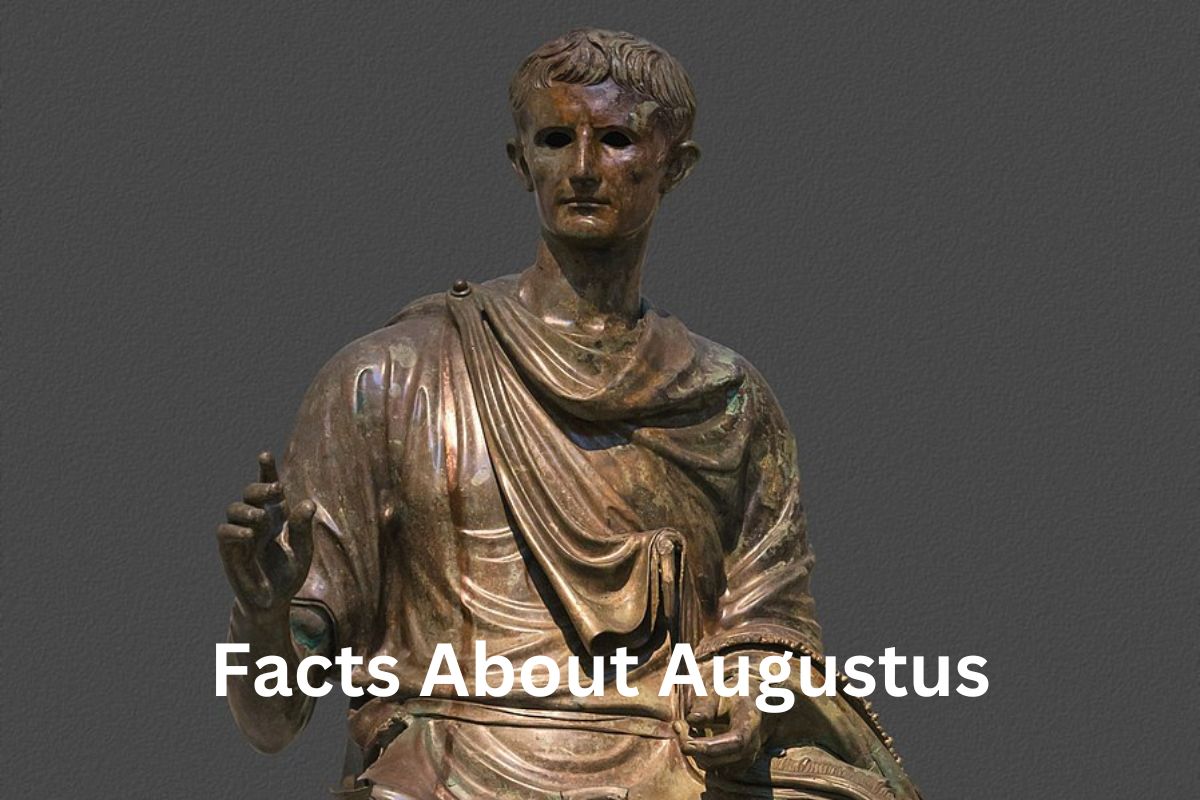Augustus, born Gaius Octavius Thurinus on September 23, 63 BC, in Rome, Italy, was the first emperor of Rome and a pivotal figure in ancient Roman history.
He rose to power after the assassination of his great-uncle Julius Caesar and emerged as the sole ruler of Rome, ushering in the transition from the Roman Republic to the Roman Empire.
Augustus implemented numerous political, administrative, and military reforms, including the establishment of the principate and the Pax Romana, which brought stability and prosperity to the empire.
Despite facing revolts and political conspiracies, Augustus successfully maintained control over the empire. He died on August 19, AD 14, leaving behind a legacy of a powerful and influential ruler who laid the foundation for the Roman Empire’s long-lasting dominance.
Augustus Facts
1. Augustus, also known as Gaius Octavius, was the first emperor of Rome
Augustus, also known as Gaius Octavius, was the first emperor of Rome and ruled from 27 BC until his death in AD 14. Augustus’ ascension to power marked the end of the Roman Republic and the beginning of the Roman Empire.
Also Read: Augustus Caesar Accomplishments
After the assassination of his great-uncle Julius Caesar in 44 BC, Augustus emerged as his adopted son and heir. He played a pivotal role in the subsequent power struggle and emerged as the sole ruler of Rome.

2. He was born on September 23, 63 BC, in Rome, Italy
He was born on September 23, 63 BC, in Rome, Italy, and his full name at birth was Gaius Octavius Thurinus. He was born into a distinguished and politically influential family. His father, also named Gaius Octavius, was a senator and served as the governor of Macedonia.
Also Read: Tiberius Accomplishments
His mother, Atia, was the niece of Julius Caesar, which later proved crucial in his political rise. Despite being of noble birth, Augustus’ family was not among the most prominent in Rome, and he grew up in relatively modest circumstances.
3. Augustus was the adopted son and heir of Julius Caesar, the renowned Roman general and statesman
Augustus was the adopted son and heir of Julius Caesar, the renowned Roman general and statesman. Following the assassination of Julius Caesar, his will designated Octavius as his adopted son and heir, bequeathing him a significant portion of his wealth and political influence. Octavius, who was just 18 years old at the time, became known as Gaius Julius Caesar Octavianus.
He quickly rallied Caesar’s supporters and formed an alliance with Mark Antony and Marcus Aemilius Lepidus, forming the Second Triumvirate to avenge Caesar’s death and gain control of Rome. This alliance eventually dissolved, leading to Augustus emerging as the sole ruler.
By taking on the name “Augustus,” meaning “revered” or “majestic,” he emphasized his status as the rightful heir and successor to Julius Caesar. This adoption and inheritance were pivotal in Augustus’ rise to power, as it legitimized his claim and solidified his support among influential factions in Roman society.
4. He played a crucial role in the downfall of Mark Antony and Cleopatra, the last rulers of the Ptolemaic Kingdom of Egypt
Augustus played a crucial role in the downfall of Mark Antony and Cleopatra, the last rulers of the Ptolemaic Kingdom of Egypt. After the formation of the Second Triumvirate, Augustus, Antony, and Lepidus initially ruled Rome together.
However, Antony’s relationship with Cleopatra, the queen of Egypt, strained his alliance with Augustus. In 31 BC, their forces clashed in the Battle of Actium, where Augustus emerged victorious.
This victory led to the suicide of Antony and Cleopatra, effectively ending the Ptolemaic dynasty and solidifying Augustus’ position as the sole ruler of Rome.

5. Augustus implemented numerous political and administrative reforms that transformed Rome from a republic into an empire
Augustus implemented numerous political and administrative reforms that transformed Rome from a republic into an empire. One of his most significant reforms was the establishment of a new era of peace and stability known as the Pax Romana, or Roman Peace.
Through his military campaigns and diplomatic efforts, Augustus brought an end to the internal conflicts and civil wars that had plagued Rome for decades. This period of relative peace allowed for economic prosperity, cultural flourishing, and the consolidation of Roman power.
6. One of his most significant achievements was the creation of the principate, a new form of government
One of Augustus’ most notable achievements was the creation of the principate, a new form of government that combined elements of monarchy, aristocracy, and democracy.
Rather than declaring himself king or dictator, Augustus styled himself as the princeps, or first citizen, of Rome.
He maintained the outward forms of the republic, such as the Senate and popular assemblies, but in reality, he held supreme power and authority. This system allowed Augustus to exercise control while appeasing those who desired the continuation of the republican traditions.
7. He initiated a series of constitutional and legal reforms to strengthen the empire’s administration and maintain order
Augustus implemented a series of constitutional and legal reforms to strengthen the empire’s administration and maintain order. He reformed the Roman Senate, reducing its size and increasing its influence by granting its members greater authority in decision-making.
Augustus also established a professional civil service, known as the equestrian order, to assist in the governance of the empire. This bureaucracy ensured the efficient administration of the vast territories under Roman control.
Additionally, Augustus reorganized the military, creating a standing army that was loyal to the emperor rather than to individual generals, ensuring his control over the military apparatus of Rome. These reforms helped to centralize power and establish a stable and effective system of governance throughout the empire.
8. Augustus was a patron of the arts and culture. He supported prominent writers, poets, and historians of his time
Augustus was a patron of the arts and culture. He recognized the importance of propaganda and used it to solidify his rule and establish his legacy. He supported prominent writers, poets, and historians of his time, such as Virgil, Horace, and Livy.
Virgil’s epic poem, the “Aeneid,” was commissioned by Augustus and served as a literary propaganda piece, glorifying Rome’s past and establishing Augustus as the rightful heir to its greatness. Horace, another renowned poet, wrote odes and satires that celebrated Augustus and his accomplishments.
Livy, a historian, chronicled Rome’s history and wrote “Ab Urbe Condita,” a monumental work that spanned the history of Rome from its legendary founding to his own time, with Augustus being portrayed as the restorer of order and stability.
9. He embarked on an ambitious building program in Rome, known as Augustan architecture
Under Augustus’ rule, Rome experienced a flourishing of literature, architecture, and artistic endeavors. This period, known as the Augustan Age or Golden Age of Latin Literature, saw the development of Roman literature and the refinement of artistic styles.
It was marked by a revival of classical ideals, a focus on moral and ethical values, and an emphasis on the virtues of Rome. Augustus himself took a keen interest in architectural projects, initiating a significant building program in Rome.
He constructed numerous public buildings, temples, and monuments, such as the Forum of Augustus, the Ara Pacis (Altar of Peace), and the Mausoleum of Augustus. These architectural endeavors aimed to beautify the city, showcase Roman achievements, and propagate the image of Augustus as a great leader and patron of the arts.
10. Augustus significantly expanded the territory of the Roman Empire through military conquests and diplomacy
Augustus significantly expanded the territory of the Roman Empire through military conquests and diplomacy. He undertook military campaigns in various regions, including Gaul, Hispania, and Illyricum, which resulted in the annexation of new territories and the extension of Roman influence.
One of his most notable conquests was the annexation of Egypt in 30 BC, following the defeat of Mark Antony and Cleopatra. Egypt, with its vast wealth and resources, became an integral part of the Roman Empire. Additionally, Augustus engaged in diplomacy, forming alliances and establishing client kingdoms to maintain stability and secure the empire’s borders.
Through these conquests and diplomatic efforts, Augustus expanded Roman dominion, making it the largest it had ever been in history. His territorial acquisitions laid the foundation for the later Roman Empire and shaped the geopolitical landscape of the Mediterranean for centuries to come.
11. Despite his achievements, Augustus faced several challenges during his reign, including revolts and political conspiracies
Despite his achievements, Augustus faced several challenges during his reign, including revolts and political conspiracies. Some notable revolts against his rule include the uprising led by the general Quintus Varus in Germania in AD 9, which resulted in a significant Roman defeat and the loss of three legions.
Augustus was deeply affected by this defeat and reportedly exclaimed, “Varus, give me back my legions!” However, he was able to suppress other uprisings and maintain control over the empire.
Augustus also faced political conspiracies, with some senators and influential figures plotting against him. One of the most famous conspiracies was the conspiracy of Lepidus, a former ally and member of the Second Triumvirate, who sought to overthrow Augustus in 22 BC.
The conspiracy was foiled, and Lepidus was exiled. Augustus showed political acumen in dealing with these threats, using a combination of diplomacy, propaganda, and force to neutralize potential opponents and maintain his authority.
12. Augustus was married three times
Augustus was married three times. His first wife was Clodia Pulchra, whom he divorced shortly after their marriage. His second wife was Scribonia, with whom he had a daughter named Julia. Scribonia was divorced by Augustus soon after the birth of their child.
His third and final wife was Livia Drusilla, whom he married in 38 BC. Livia was a powerful and influential figure and played a significant role in Augustus’ reign. She was known for her intelligence and political acumen, and Augustus valued her counsel.
Livia became a beloved figure in Roman society and was revered as the ideal Roman matron. She outlived Augustus and had a lasting impact on subsequent emperors.
13. Augustus died on August 19, AD 14, at the age of 75. He was succeeded by his stepson Tiberius as the second emperor of Rome
Augustus died on August 19, AD 14, at the age of 75. His death marked the end of his remarkable reign and the beginning of a smooth transition of power to his chosen successor, his stepson Tiberius.
Augustus left behind a stable and prosperous empire, with its territories firmly under Roman control. He was given the title of Divus Augustus, or the Divine Augustus, by the Senate, cementing his status as a revered figure in Roman history.
The reign of Augustus laid the foundation for the Roman Empire’s long-lasting dominance and established a model of imperial rule that shaped future emperors. His legacy as the first emperor of Rome and the founder of the Julio-Claudian dynasty left an indelible mark on Roman history and the Western world.
